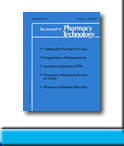 |
 |
Cefepime Neurotoxicity in an Adolescent Cystic Fibrosis
Patient with Aminoglycoside-Induced Acute Kidney Injury
Kristen R Nichols, Danielle M Brown, Chad A Knoderer, and
Sharon P Andreoli
To request full article click here.
Objective: To describe a case of cefepime neurotoxicity in an adolescent with cystic fibrosis and aminoglycoside-associated acute kidney injury (AKI).
Case Summary: A 15-year-old, 46-kg male with cystic fibrosis (CF) and chronic sinusitis was admitted to the hospital for CF exacerbation. The patient was subsequently discharged to complete home antibiotic therapy with intravenous gentamicin and cefepime. Thirteen days after discharge, while still receiving intravenous antibiotics, the patient presented to an outside hospital complaining of vomiting, fatigue, decreased appetite, and decreased urine output. The patient was diagnosed with AKI and was transferred to our institution, where he displayed signs and symptoms consistent with encephalopathy. Encephalopathy was thought to be consistent with cefepime-associated neurotoxicity. After 2 hemodialysis sessions, the encephalopathy resolved. Over the course of admission, the patient’s renal function improved.
Discussion: This patient experienced neurotoxicity thought to be secondary to cefepime in the setting of AKI. Aminoglycoside therapy most likely led to the AKI. We believe that our patient represents the fourth pediatric patient with cefepime-associated encephalopathy described in the literature and the second without chronic renal dysfunction.
CONCLUSIONS: Children receiving cefepime should be monitored for AKI. In the presence of AKI, cefepime doses may need to be adjusted and the patient should be monitored for signs and symptoms of neurotoxicity.
J Pharm Technol 2011;27:164-7.
To request full article click here.
|
|
|
||
|

